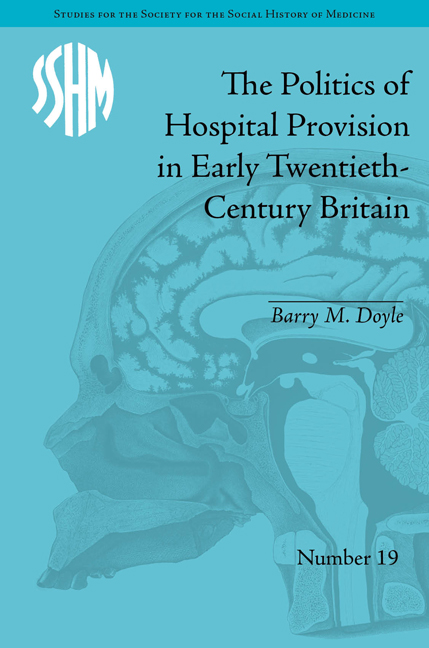Book contents
- Frontmatter
- CONTENTS
- Dedication
- Acknowledgements
- List of Tables
- Introduction
- 1 Leeds and Sheffield: Economic, Social and Political Change
- 2 Hospital Provision: Voluntary and Municipal
- 3 Patients and Access
- 4 Specialization and the Challenges of Modern Medicine
- 5 Finance
- 6 The Politics of Hospital Provision
- 7 Co-operation, Competition and the Development of Hospital Systems
- Conclusion
- Notes
- Works Cited
- Index
4 - Specialization and the Challenges of Modern Medicine
- Frontmatter
- CONTENTS
- Dedication
- Acknowledgements
- List of Tables
- Introduction
- 1 Leeds and Sheffield: Economic, Social and Political Change
- 2 Hospital Provision: Voluntary and Municipal
- 3 Patients and Access
- 4 Specialization and the Challenges of Modern Medicine
- 5 Finance
- 6 The Politics of Hospital Provision
- 7 Co-operation, Competition and the Development of Hospital Systems
- Conclusion
- Notes
- Works Cited
- Index
Summary
As hospital patients diversified in the first half of the twentieth century, so too did the institutions and staff who treated them. New techniques and knowledge, medical markets and the desire to order and manage patients all influenced the emergence of hospital specialization and by the arrival of the NHS the population at large increasingly identified the hospital as a centre of specialist treatment. Moreover, as the population became healthier and wealthier their expectations of hospitals changed. They began to see them as places where modern medicine would cure or at least repair them while their financial contributions gave them a sense of entitlement to the best, most advance care. These new demands from a more affluent and democratic society produced variable responses, reflecting the effects of the economy and the relationships and hierarchies within the different hospital structures. They also added a new element to the stimulus to special services – local need. Rather than the diversity of specialist provision reflecting the failings of a system which had arisen without the benefits of rational planning, difference may have emerged from priorities shaped by specific economic and social structures and the ensuing political priorities. This chapter will consider the development of specialist services, especially those emerging between the wars, such as mental health outpatient services, and will then address two case studies which illuminate the influence of local economic, social and political factors in the shaping of orthopaedic and maternity services.
- Type
- Chapter
- Information
- Publisher: Pickering & ChattoFirst published in: 2014

